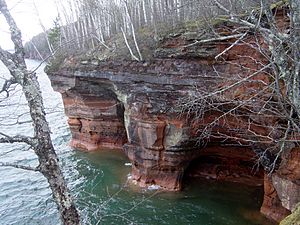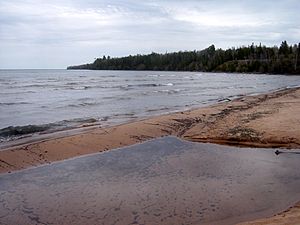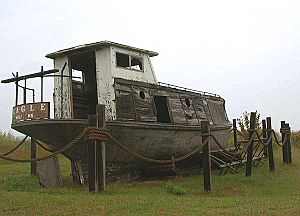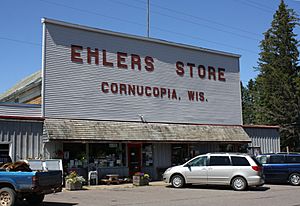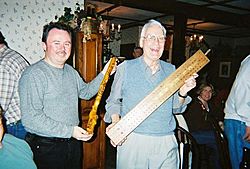Cornucopia, Wisconsin facts for kids
Quick facts for kids
Cornucopia, Wisconsin
|
|
|---|---|
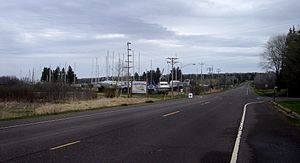
Cornucopia along Highway 13
|
|
| Country | United States |
| State | Wisconsin |
| County | Bayfield |
| Town | Bell |
| Area | |
| • Total | 2.264 sq mi (5.86 km2) |
| • Land | 2.264 sq mi (5.86 km2) |
| • Water | 0 sq mi (0 km2) |
| Elevation | 623 ft (190 m) |
| Population
(2010)
|
|
| • Total | 98 |
| • Density | 43.29/sq mi (16.71/km2) |
| Time zone | UTC-6 (Central (CST)) |
| • Summer (DST) | UTC-5 (CDT) |
| ZIP code |
54827
|
| Area code(s) | 715 and 534 |
| GNIS feature ID | 1579043 |
Cornucopia is a small community in northern Bayfield County, Wisconsin, United States. It is located in the town of Bell. Cornucopia is an "unincorporated" area, meaning it doesn't have its own separate local government like a city or village. It is also a "census-designated place," which means the U.S. Census Bureau counts it as a specific area for population statistics.
This charming place sits right on the shores of Lake Superior. It is at the very northern tip of the Bayfield Peninsula. You can find Cornucopia along Wisconsin Highway 13 and County Highway C. In 2010, only 98 people lived here. The community is next to Siskiwit Bay, between Roman's Point and Mawikwe Point. It is also close to the mainland part of the Apostle Islands National Lakeshore, famous for its beautiful Mawikwe Bay Sea Caves.
Contents
Where is Cornucopia Located?
Cornucopia covers an area of about 2.264 square miles (5.86 square kilometers). All of this area is land. It does not include any water within its official boundaries.
A Look Back at Cornucopia's Past
Early History and Native American Presence
The Ojibwe people used the Siskiwit Bay area long ago. They used it as a temporary camp and a resting spot on their way to La Pointe. The name "Siskiwit" comes from an Ojibwe word. It means a type of Lake trout known as a "fat trout."
A historical marker at the Cornucopia beach tells a story called the "Tragedy of the Siskiwit." This story describes a battle between the Ojibwe and a group of Meskwaki people. Several lives were lost, and a chief's son was taken during this event.
First Settlers and Logging Days
The first European settlers came to Siskiwit Bay in the late 1800s. They were mostly loggers who came to cut down trees. You can still see signs of this time, like old railroad pilings in Siskiwit Lake. There's also a local legend about stolen gold on Gold Hill, at the edge of the community.
Farmers from Eastern Europe
Some of the first farmers in the Town of Bell came from the Austrian Empire. They were not from Russia, but were Rusyns. This ethnic group comes from the mountains near Poland, Slovakia, Ukraine, and Romania. Some Rusyn family names still found in Cornucopia today include Kaseno, Celinsky, Sveda, Roman, and Pristash.
The Fishing Industry
For many years, commercial fishing was a big part of Cornucopia's economy. Fishermen caught lake trout, whitefish, and freshwater herring. Families like the Jones, Ehlers, Johnson, and Ivanow helped keep the fishing industry strong throughout the 1900s. Today, only the Halvorson family still fishes commercially from Cornucopia's harbor.
How Cornucopia Got Its Name
In 1903, two land investors from Iowa, T.J. Stevenson and Albert Wescott, started a post office here. They named the village "Cornucopia." This name means "horn of plenty," suggesting a place with lots of resources. In 2003, the community celebrated its 100th birthday.
Tourism Becomes Important
After World War II, people started to appreciate Cornucopia's beautiful natural surroundings. Because of this, tourism began to grow. It eventually replaced logging, farming, and fishing as the main industry. Today, most working adults in Cornucopia have jobs in trades, services, or seasonal tourism.
Important Places in Cornucopia
Bell Town Hall
The Bell Town Hall is a large brick building in the middle of Cornucopia. It used to be a school until the 1970s. Now, children from Cornucopia go to school at the South Shore School in Port Wing, Wisconsin, about 15 miles away. The town hall has been updated with a new kitchen and windows. It is a popular place for weddings, family events, and community gatherings, like the yearly fish fry. The baseball field nearby used to be the home of the Cornucopia Little League team.
Churches in the Community
Cornucopia has three active churches. They are St. Ann's Roman Catholic Church, Immanuel Lutheran Church, and St. Mary's Orthodox Church of America. St. Mary's was first built as a Russian Orthodox church. It has a special design with a bell tower and a small onion-shaped dome.
Cornucopia Historic Museum
The Cornucopia Historic Museum, also known as the Green Shed, is located by the harbor. It has displays of old photographs, family stories, and historical items. You can visit the museum during the warmer months, from mid-June to early October.
Cornucopia Post Office
The Cornucopia Post Office holds a special title. It is the northernmost post office in the entire state of Wisconsin!
What is Cornucopia's Economy Like?
Siskiwit Bay Marina
The Siskiwit Bay Marina is right in the center of Cornucopia. Boaters from all over the Midwest come here to enjoy their summers. The marina also has a bed and breakfast where guests can enjoy breakfast every morning.
Ehlers' General Store
In 1915, a lumberman named Walter Flieth and a fisherman named Herman Ehlers started the Flieth-Ehlers Mercantile Company. Today, it is known as Ehlers' General Store. This store has been the main social and business hub of the community since it opened. Herman Ehlers' son Harold and grandson Mark ran the store for many years. In 2006, they sold it to Jayne Norton and Max Taubert.
The Harbor and Beaches
Cornucopia has a harbor where the Siskiwit River flows into Lake Superior. Today, there are two marinas in Cornucopia, one private and one run by the town. There is also a large, sandy swimming beach. Many gift shops and places to stay can be found along the harbor.
The Imaginary Yacht Club
Cornucopia was once home to the Cornucopia Yacht Club. This was an imaginary yacht club started by Hale, Roger, and Scot O'Malley in 1975. They created the club so they could visit yacht club marinas in other cities. These marinas usually required you to be a member of another club.
Even though the club printed membership cards and made jackets, it never had its own marina or building. Its mailing address was "Pier 99," which was actually a post office box at Cornucopia's post office. Joining the club cost only $5 a year. Members didn't even need to own a boat! The application just asked what they would name their boat if they had one. The club once had over 700 members, including some who had never even visited Cornucopia. The founders said that former U.S. President Gerald Ford and his wife Betty were even members!
Fun Events in Cornucopia
Cornucopia Day
Cornucopia Day happens every year on the second Saturday in August. This event helps raise money for the volunteer fire department and ambulance service. It includes a 5K run, a bike ride, food like fish, brats, and corn, a parade, a flea market, and raffles.
Annual Fish Fry
The Annual Fish Fry takes place on the Sunday closest to July 4th. It's a popular event for locals and visitors.
Annual Turkey Dinner
The Annual Turkey Dinner is held on the first Sunday of deer hunting season. This is the Sunday before Thanksgiving.
Cribbage League
The Cribbage League is a five-week competition. It takes place every January and February. Residents of Cornucopia play against people from the nearby community of Red Cliff, Wisconsin.
Images for kids
See also
 In Spanish: Cornucopia (Wisconsin) para niños
In Spanish: Cornucopia (Wisconsin) para niños
 | Sharif Bey |
 | Hale Woodruff |
 | Richmond Barthé |
 | Purvis Young |



